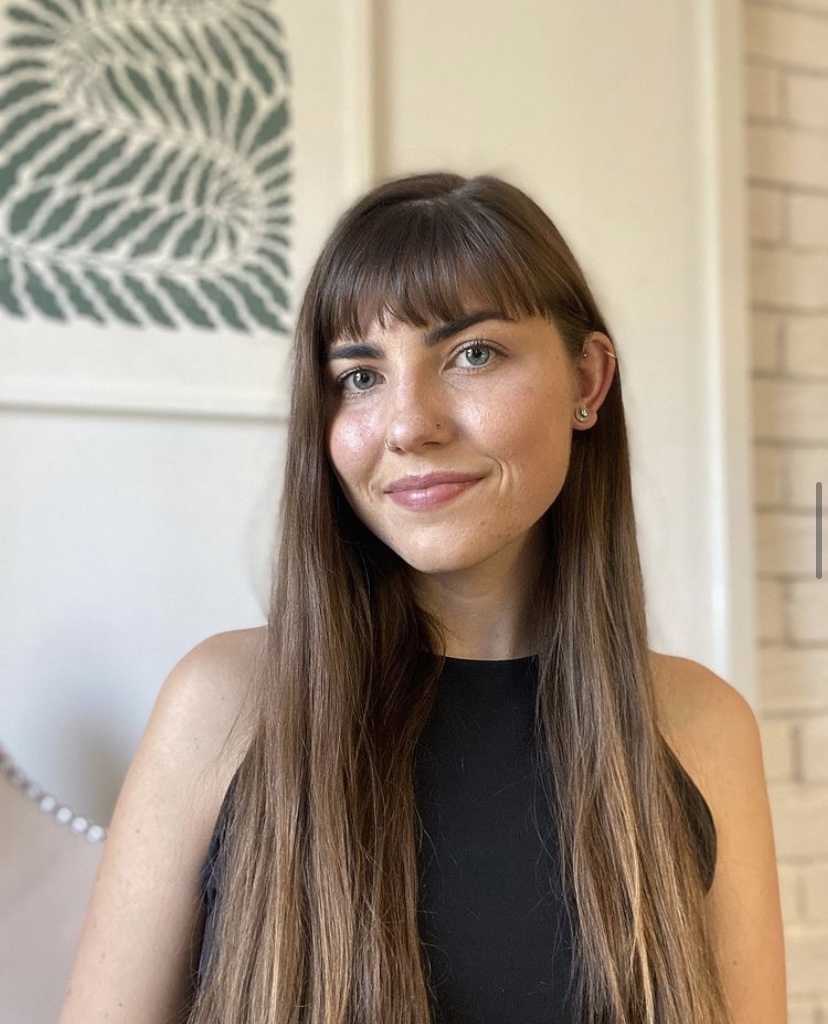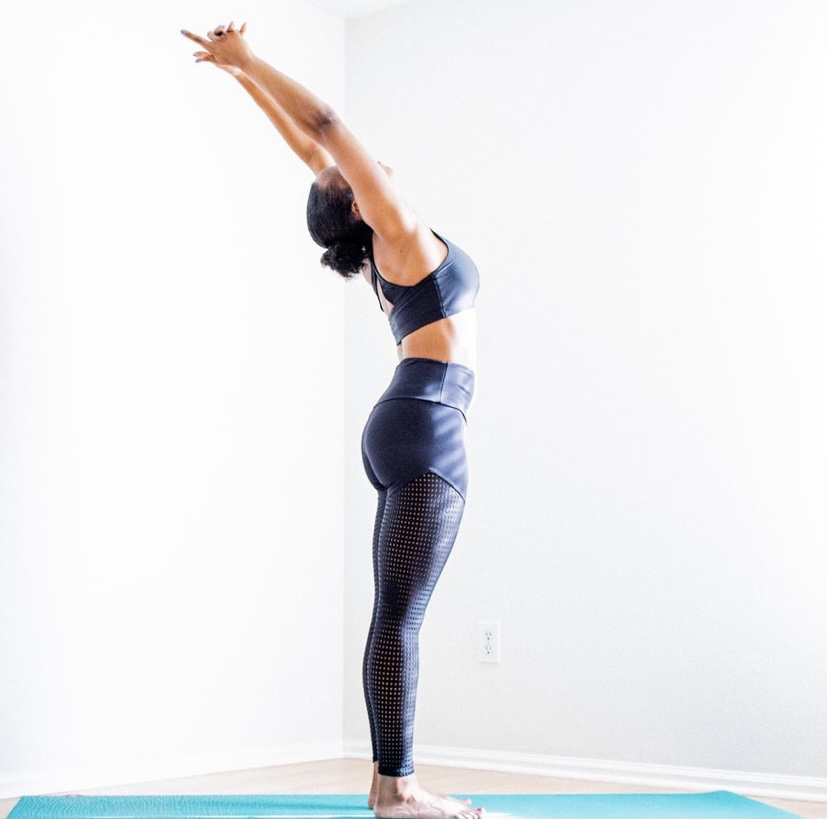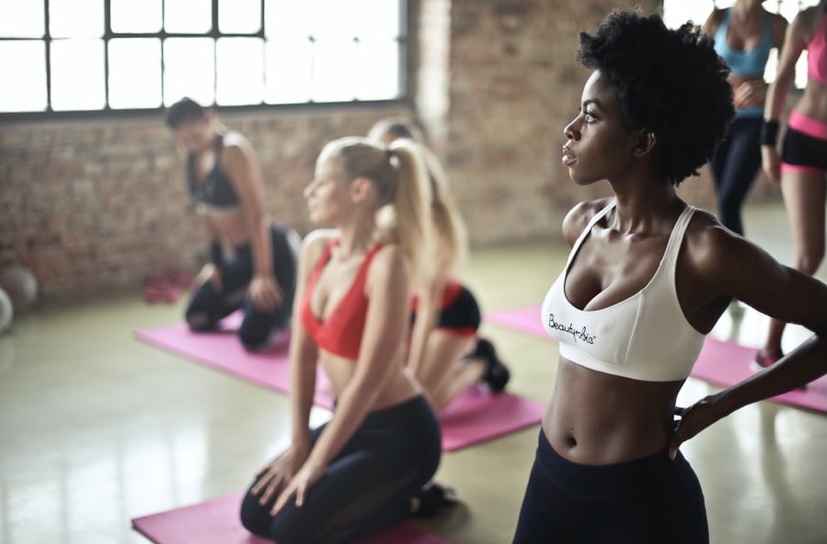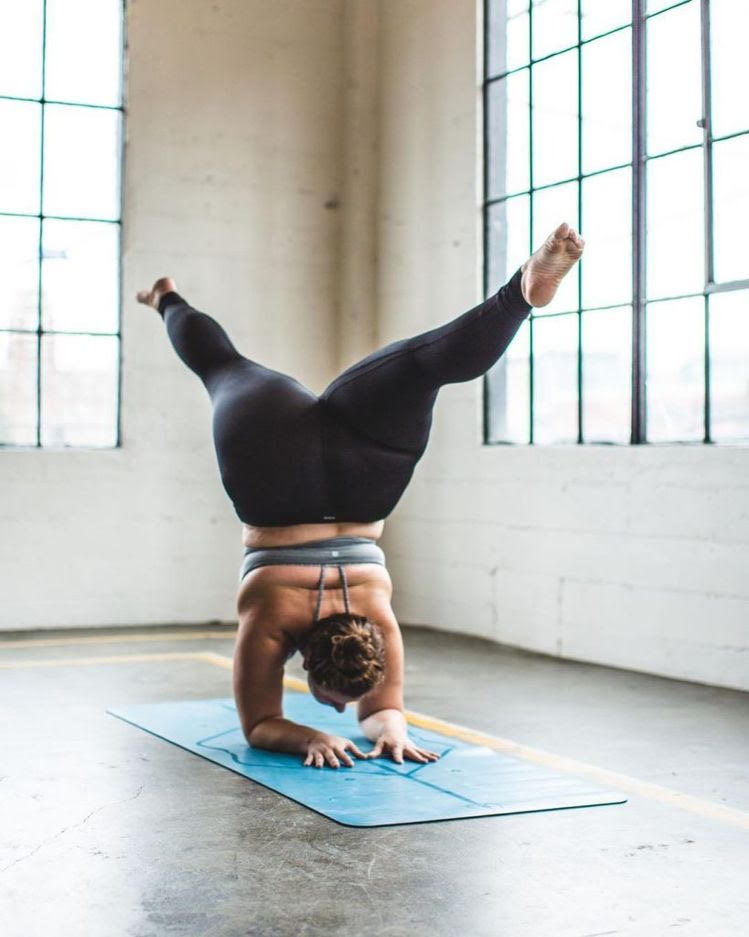
1. Why and how did you start doing yoga? What are some signs that someone should start practicing yoga?
I went to my first yoga class when I was 17 with my cousins. It was a hot yoga class at a new studio in our small hometown. It was not what I expected it to be, I thought it would feel much more like any other workout I had done, but my body welcomed this form of movement better than any I had done before. I kept taking classes and found some great yoga channels on YouTube. I ran cross country in high school and found yoga to be a great supplementary workout and recovery. For me it grew into a much more personal practice and lifestyle. I think everyone should do yoga! It is so beneficial to your mental and physical wellbeing, in a lasting and sustainable way. Specifically, individuals who are experiencing anxiety, depression, low confidence, fatigue, joint or muscle pain, stagnant energy, and a multitude of other things can benefit from yoga. (***I am not a mental health professional or doctor, I am only speaking from personal experience and the experience of those I have worked with.)
2. How has yoga impacted your mental health? What is the impact of yoga on mental wellness (depression and anxiety, specifically)?
I have been practicing yoga since I was 17, so at this point my practice feels like my home. I feel safe and strong and calm on my mat. The community of friends yoga has brought me has also been so impactful on my life and happiness, some of my best friendships have been formed in a studio. At the beginning of the year, I did my first 200 hour yoga teacher training (this is the first level of standard training most people do if they want to teach or simply deepen their practice) which ended on March 8, right before quarantine began in the US. The timing was disheartening, because I was hoping to jump in and teach in a studio as soon as possible! A few months into quarantine, my studio I had trained at had to close and move completely to an online platform, as did many others. Like many, I felt a decline in my mental health and overall happiness in March 2020 and into most of the year. My mat was always a safe place I could come back to and my yoga practice kept me focused on something during all of the uncertainty of this year. Before this year, yoga class or home practice was always a pause in my day where I could reset my mind, breath, and nervous system. This was especially helpful during my years in college and continues to be helpful now that I am working.

3. Some Christian women refuse to do yoga, because it is argued that it is rooted in eastern religious ideals. What is your opinion on Christian women participating in yoga?
In my personal belief and understanding, people have convictions about some things that other people may not, and that is okay. I also believe that our minds have a strong connection to our soul so therefore what we think or believe informs the gut feelings or convictions we have about certain things. The latin word psyche refers to the human mind, soul, and spirit, which came from the greek word psukhē which means breath, life, soul. Knowing how connected our mind and soul truly are, based on how they were historically defined, it’s easy to see how our religious beliefs can keep us from something such as yoga that is newer to the western world and seemingly is a religion in itself. However, yoga is not a religion. It is a spiritual practice that can help align our body with our psyche. Yoga comes from the eastern world in a region where Hinduism is practiced. The two practices are not directly linked, but they do exist side by side. The idea that they are closely connected is what often keeps Christians away; they are concerned that if they practice yoga, they will be practicing a different religion that goes against their own. If your intention going into yoga is to connect with the gods of Hinduism, you can achieve that. If your intention going into yoga is to connect with the Christian God, you can do that. If your intention going into yoga is to find a moment of peace and solitude, you can do that. Your mind has a lot more control than you may think. That being said, you ultimately know your mind and soul best. If yoga seems to pull you further from your religious beliefs and unsettles your spiritual self, you can use your own judgment as to whether or not it will be a healthy and beneficial practice for you. Yoga is meant to nourish, heal, and connect but it may not do that for everyone.
4. What advice do you have for women who want to learn how to do yoga, but don’t have the financial ability to join classes, buy a yoga mat, etc. Do you have any recommendations for affordable resources that are easily accessible?
Yoga can definitely be an expensive activity, unfortunately, but it doesn’t have to be! When I first started yoga, I was in high school and only had enough spare money to go to one class a week. Most of my practice at that time was done at home, without a yoga mat, using free videos on YouTube! My favorite channel was (and still is!) Yoga With Adriene. She has so many great free offerings. There are a variety of yoga mats to choose from and the nicer the mat, the more expensive it will be. I suggest getting a cheap starter mat. I used my (not-so-great-quality) mat from Target for years when I first started practicing! I only upgraded to a bit more expensive one last year. The bottom line is you don’t need fancy equipment or clothing to start yoga. A great affordable option and alternative to studio practice is practicing at home! Starting a personal at-home practice without an instructor or video can be intimidating, but it is definitely possible and very freeing! Try searching Google, Pinterest or Instagram for yoga flows that you can try on your own. Or try the flow I include here on the Mental Health Baes Blog and incorporate the different postures into your own yoga flow!

5. How is yoga different from stretching and other ways to exercise? How is it more beneficial for those who struggle with mental illness?
Yoga in English means to “yoke”. It is a joining of the body, mind and soul; breath is linked to movement which helps align your mind and recalibrate the nervous system. There is a level of mindfulness and fluidity found in a yoga flow practice that isn’t matched with simply stretching. The breath is used as a component of strength to help the muscles strengthen and work through difficult postures. This combination of breath and body help the mind to really hone in and focus on the task, helping to strengthen neural connections as well. Combining that with the boost of dopamine you get from moving your body creates such a beautiful environment within your brain and body!
6. Can you elaborate on the mental component of yoga? How does yoga practically increase your self awareness, etc?
Yoga is meant to connect your mind with your body. A yoga practice gives you something to fully focus your mind on in a way that is thoroughly calming. The connection of your breath with your movement in your practice can help your mind deeply focus. Through practicing yoga, you get to know your body in a new way and can build self trust. Oftentimes you will hear teachers talk about asanas, or postures, as a metaphor for challenges in life. We can connect to our breath and breathe through difficult movements on our mat, which can translate into how we deal with situations in our everyday life. One of my yoga teachers always says “our physiology informs our psychology”. I think about this mantra a lot in my own practice, understanding that how I move through my body will inform and influence my thought patterns.
7. What is your advice for women who have body insecurity, but want to practice yoga for weight loss or to gain body confidence.
Having body insecurities when stepping into the realm of yoga is a completely valid feeling that many women experience, mostly due to harmful marketing from yoga companies these days; most yoga clothing brands choose models with slender, muscular bodies which communicates that “yoga bodies” have to look a certain way. This is just simply not the truth.
Every body is a yoga body.
During my training, one of my teachers always repeated “we want to fit the pose into our unique body, not our body into the pose”. Yoga is a fully personal practice that will look different on everyone. I also truly believe that the more you practice, the more attuned to your body you will become and you will appreciate that the body you have allows you to move and breath and live.

8. What advice do you have for women who desire to participate in yoga, but live a very sedentary lifestyle, and are not as comfortable with their flexibility or movement?
I say just start and start small! Starting a yoga practice can be intimidating, but if you want to start anything in life, you have to start somewhere even if it involves getting out of your comfort zone a little bit. When I say start small, I mean start really small. There are poses you can do in your pj’s while still in bed when you wake up. In the mornings, try this:
- While still lying down, stretch your arms towards the head of your bed and your feet towards the foot of your bed.
- Draw your knees in towards your chest, giving yourself a hug
- Drop both knees towards the right, looking over your left shoulder for a spinal twist
- Bring knees back towards center
- Drop both knees towards the left, looking over your right shoulder for a spinal twist
- Bring knees back towards center
- Sit up in your bed, stretching arms over head
- Drop your left hand to your right knee, juicy spinal twist
- Hands stretch back over head
- Drop your right hand to your left knee, juicy spinal twist
- Hands back over head
- Child’s pose
- Have a beautiful morning! You just did yoga 🙂
9. What advice do you have for women who want to start practicing yoga, but are intimidated by how difficult it looks or feels?
Again, starting anything new will be intimidating and nerve-wracking. THAT IS OKAY! These nerves remind us that we are alive, we are human and we have room to grow. Step into that new space for growth and just start, however small starting may look for you.
10. How often do you practice yoga? How often do you think beginners should practice yoga?
I try to do yoga everyday in some capacity, but that looks different everyday. Somedays, I do a full hour long free flow that I make up as I go, others I may work through the ashtanga primary series. Somedays I’ll take a class online, other days I’ll go in studio (not a common occurrence these days due to Covid-19!). Some days, I’ll simply meditate for ten minutes, others I’ll lie on my yoga mat with some quiet music and just simply be still for a few minutes. Let go of the idea that yoga has to look a certain way and be a strict practice, although it can certainly be more regimented and strict if you need that! There truly is something for everyone in yoga. It can be such a great way to let your creative mind release energy or a tool for healing and transformation. Allow yourself to start and grow your practice organically.